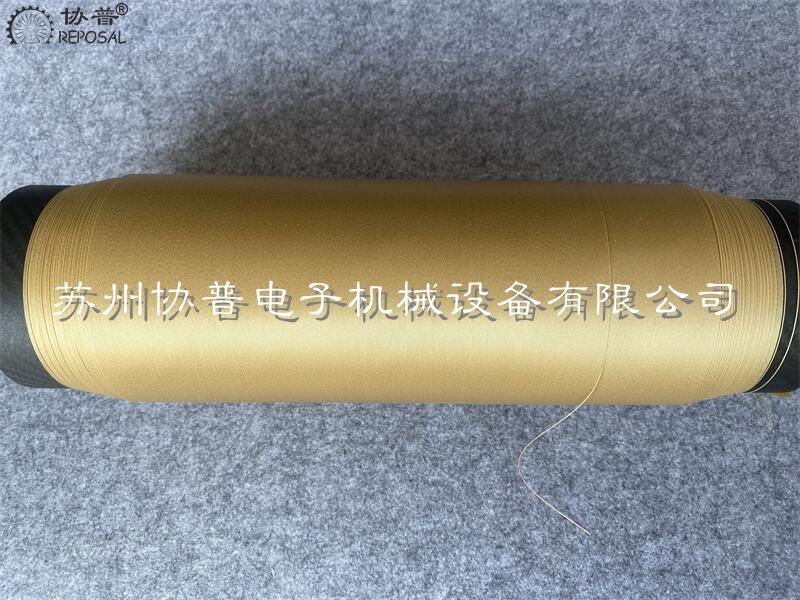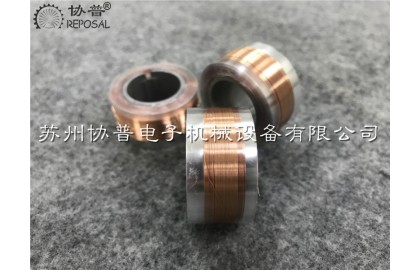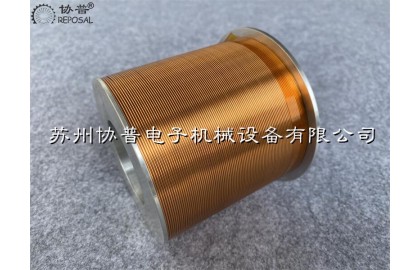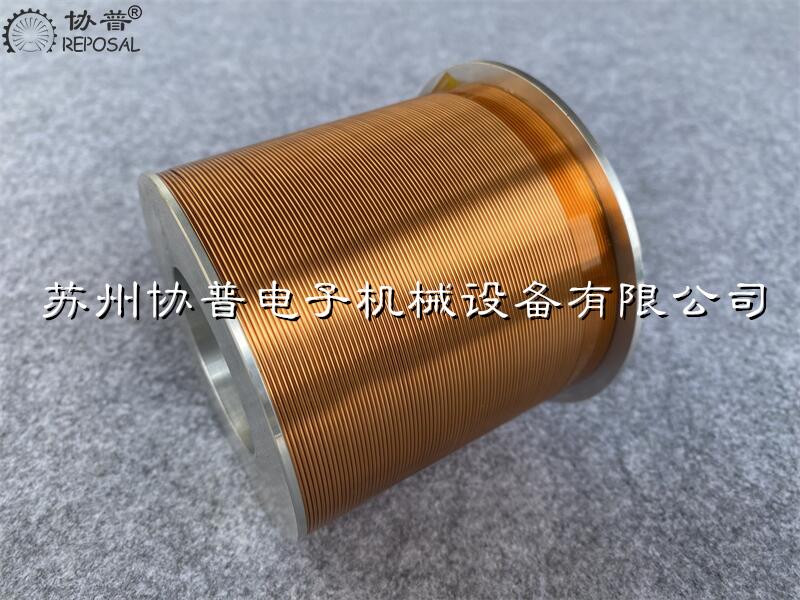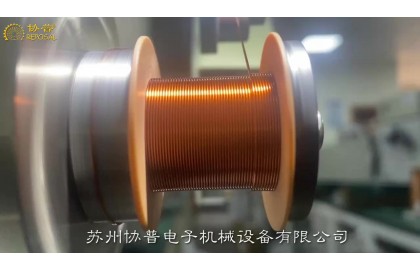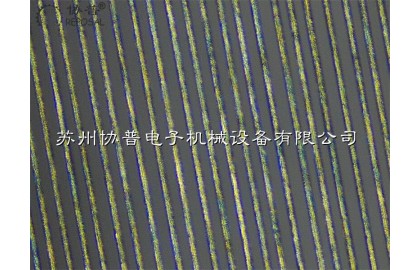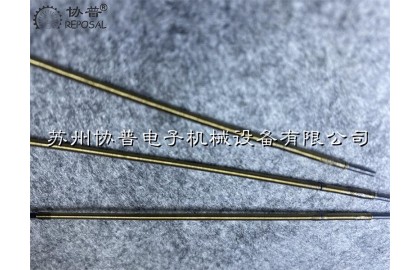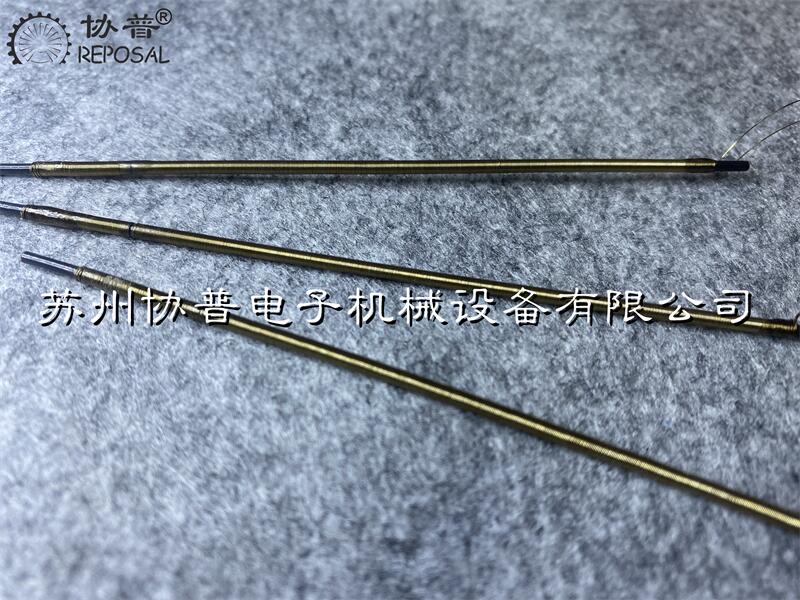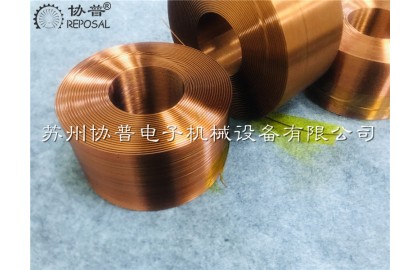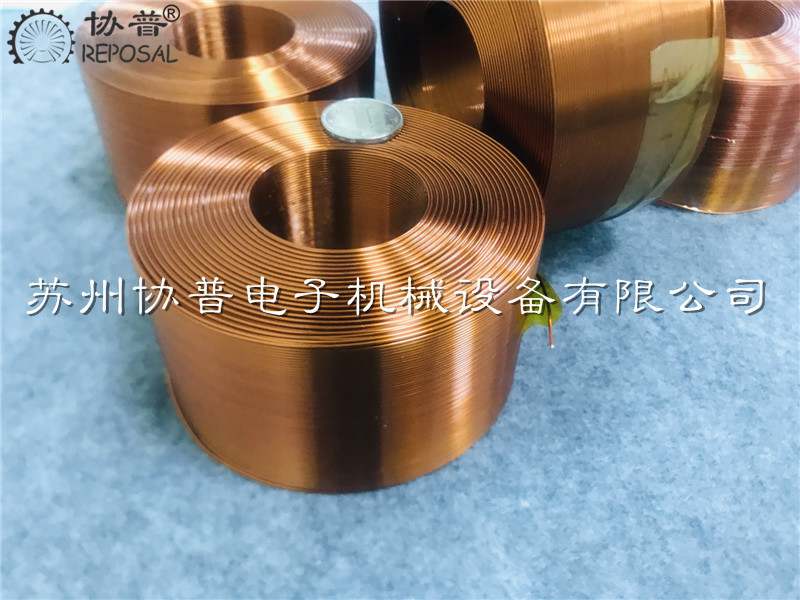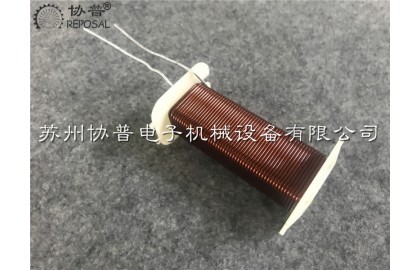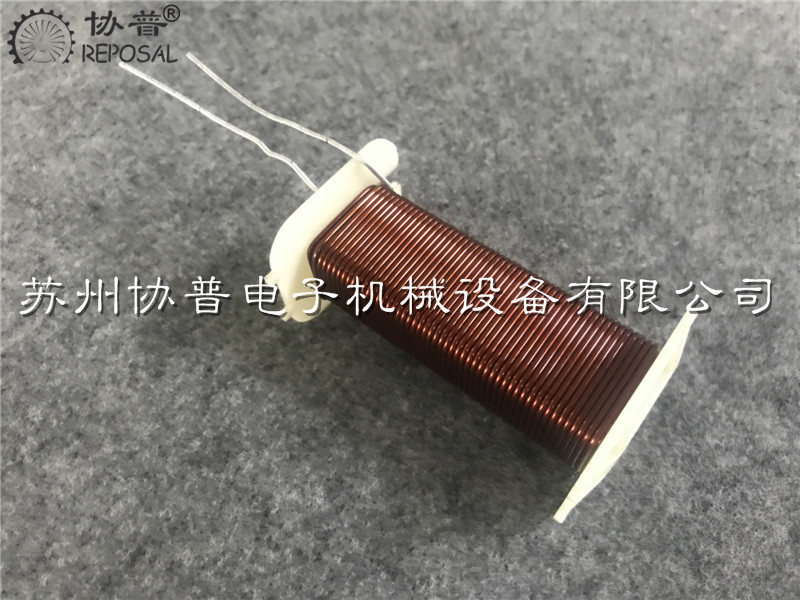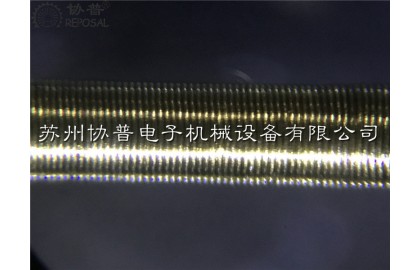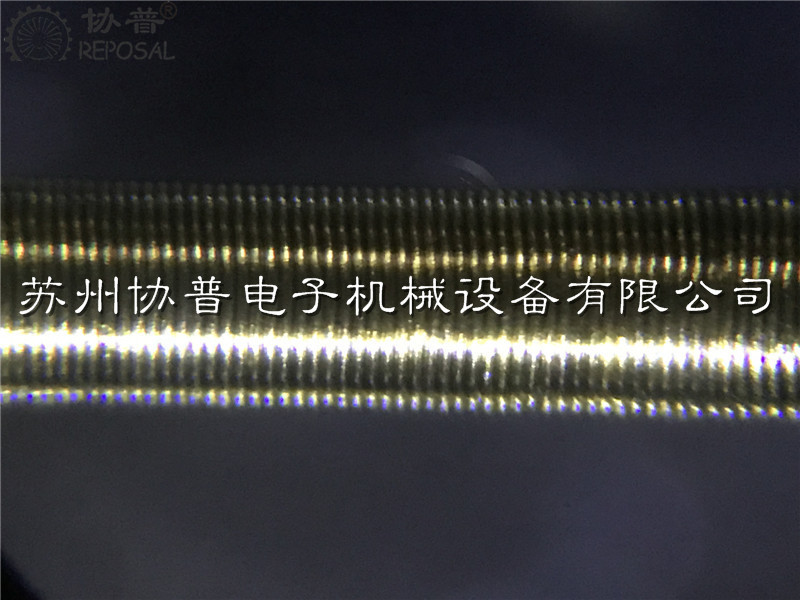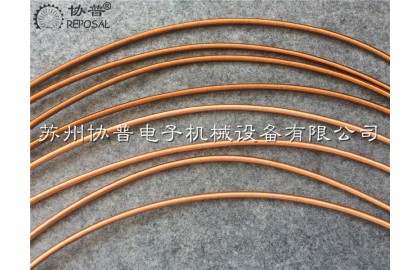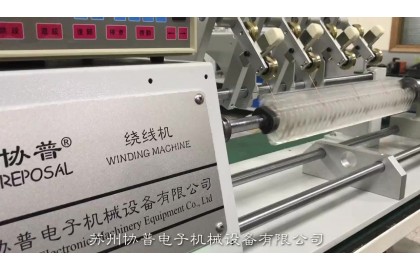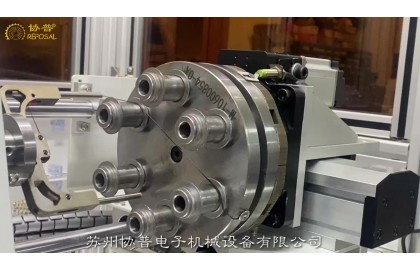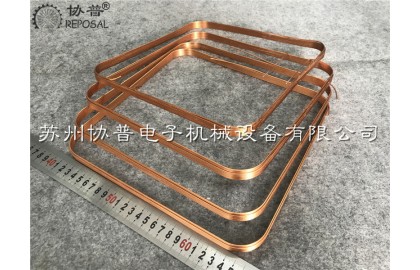REPOSAL® winding machine wire guided missile fiber winding forming technology has made a new breakthrough
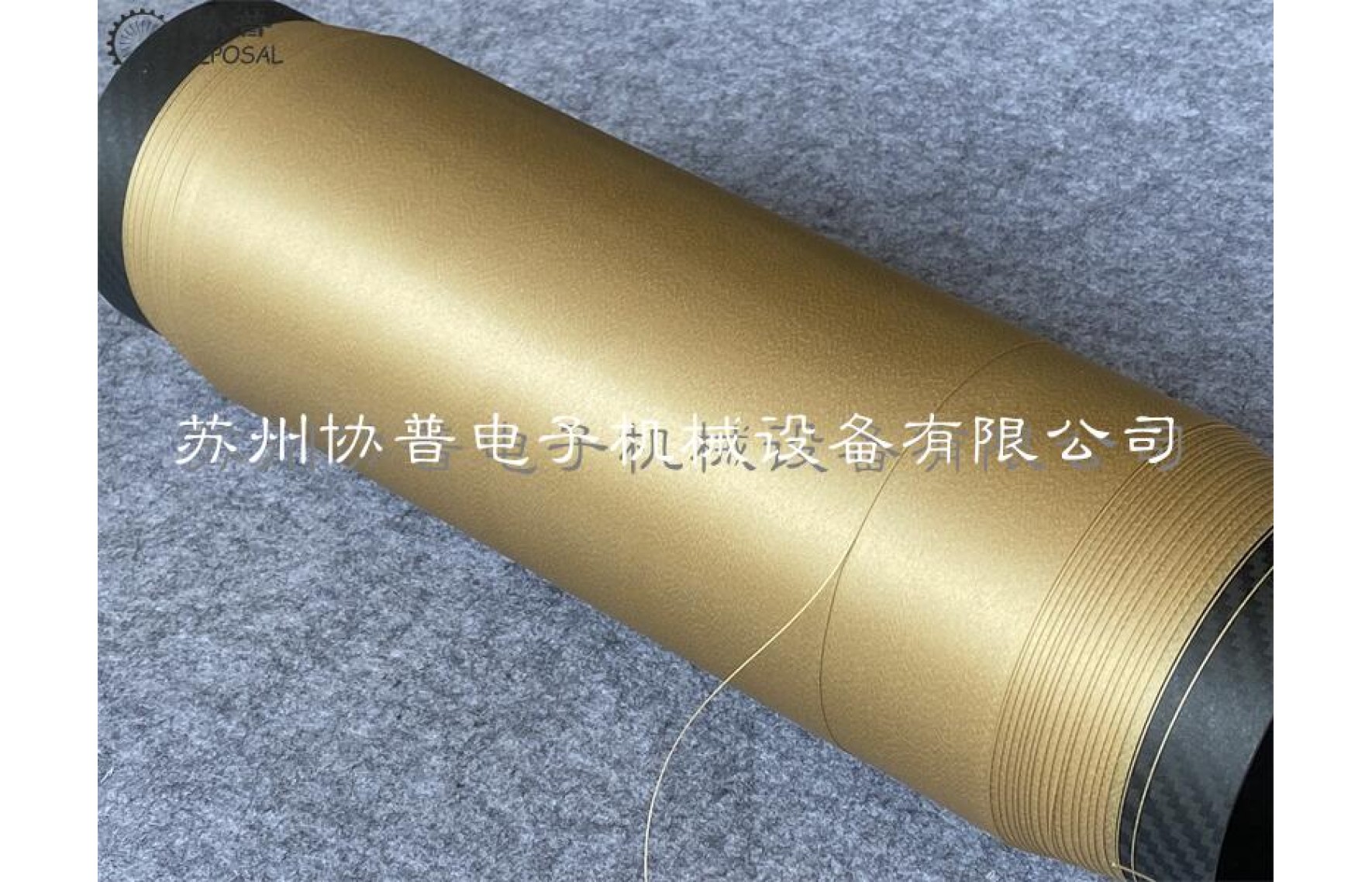
REPOSAL ® winding machine wire guided missile fiber winding forming technology has made a new breakthrough
Fiber optic guidance of wire-guided missile is a closed-loop guidance and control of controlled missile by bidirectional transmission of information and control signals between missile and launcher using special fiber optics.
Fiber optic guidance belongs to the wire guidance of remote control guidance, its advantages are not only high precision, strong anti-interference ability, can be equipped with optical cable shaft, micro camera, missile launch tail will release fiber, can control the missile and obtain target information.
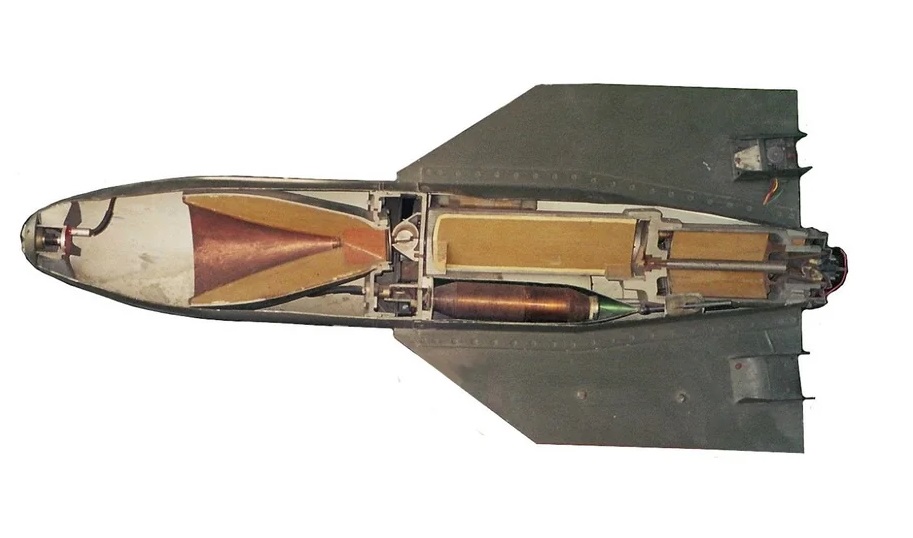
The winding and release technology of optical fiber is a key technology of optical fiber guidance. At present, we have not realized automatic production in the production of optical fiber winding in our country, so we rely on the winding technical personnel's proficiency very high. The cross-turns working procedure of the winding process is still mainly manual operation, low production efficiency, high error probability and low consistency.
In addition to other ways to solve the high speed release of optical fiber, an important way is to ensure the smooth release of optical fiber through optical fiber winding. Optical fiber winding technology is the requirement of the pointer to the optical fiber guided missile and the technology of winding the optical fiber on the spool. In view of the unique properties of optical fiber and the special use of optical fiber guided missile, optical fiber winding becomes a complicated technical problem. In the process of automatic winding, the technical difficulties related to the properties of optical fiber are as follows:
The surface friction coefficient of optical fiber is very smooth and easy to slip off during winding.
The fiber is brittle and less flexible than ordinary fiber, so the fiber should be smooth and smooth during winding.
The radial elasticity of the fiber is small, and the fiber is easy to deformation due to extrusion, which increases the transmission loss, so the control precision of the interturn gap is required to be high.
Because of the aging problem, the optical fiber will have tiny cracks under the long-term action of stress, and with the passage of time, the cracks will increase and deepen, and eventually the transmission loss of the optical fiber will be seriously increased, and even the cost. Therefore, during the winding process, the tension controlling the winding is limited in order to keep the residual stress within the required range.
In view of the winding problem of guided optical fiber, REPOSAL ® winding machine began to layout research and development in 2015, after repeated trials, many times of process and equipment improvement, REPOSAL ® winding machine launched SP-ZD1020S guided optical fiber winding machine in 2023, and quickly obtained the recognition and demand of experts in related fields and the market.
Several key performance indexes of SP-ZD10250S guided fiber winding machine released by REPOSAL ® winding machine have reached the advanced level, which breaks the tight blockade of key military basic materials in advanced areas of the industry, and has milestone significance in breaking through the bottleneck of key technology of high-precision guided fiber winding and promoting the performance improvement of China's high-precision wire guided missile system.
Related Post
REPOSAL® releases layer-wound high-voltage package full-automatic interlayer insulation winding machine
REPOSAL® releases layer-wound high-voltage package full-automatic interlayer insulation winding machine
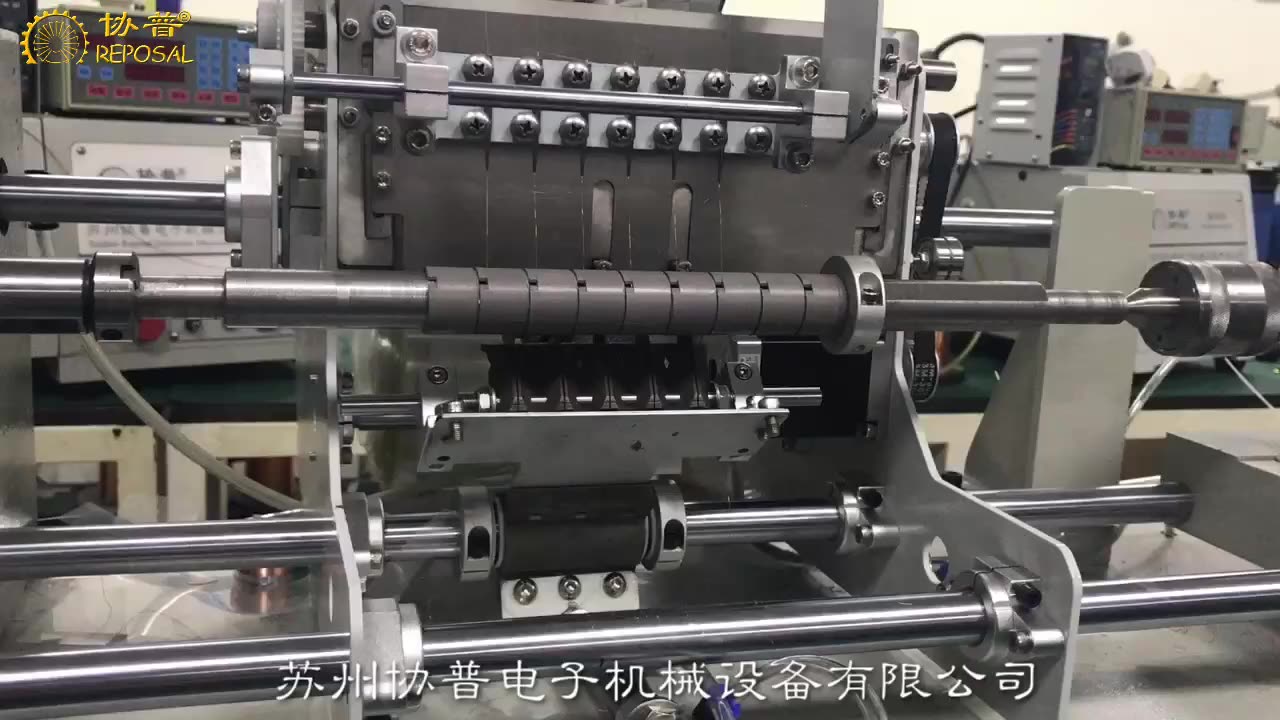
Suzhou Xiepu Electronic Machinery Equipment Co., Ltd. successfully released the SP-D102M7 model of layer-wound high-voltage package automatic interlayer insulation winding machine-this model greatly improves the winding efficiency of layer-wound high-voltage package coils, and the coil is consistent Sex. The REPOSAL® winding machine reduces the winding cost of the layer-wound high-voltage package. In the new model, it has added a compact insulation belt automatic cutting mechanism, and high-quality solutions such as dynamic balance performance after multiple skeletons are wound.
REPOSAL® winding machine has successfully provided competitive solutions to the electron microscopy winding process
The main components of scanning electron microscope are electron optics system, signal collection and processing system, vacuum system, image processing display and recording system, power system and computer control system. The core part is the electron optical system, which is mainly composed of electron gun, electromagnetic condenser, diaphragm, scanning system, astigator, objective lens and various centering coils.
Reposal® winding machine As a professional supplier of precision winding solutions, we focus on the electromagnetic condenser, objective and astigmatic, because the main components are enamoured wire windings, and the precision and consistency of the windings are highly related to the image quality of the scanning electron microscope.
Electromagnetic lens coil.
The electromagnetic lens is mainly used to restrain the electron beam and it can be regarded as a convex lens in optics. Because the electron beam in a rotating symmetric magnetic field will be subjected to the Lorentz force, resulting in a focusing effect. Therefore, the quality of the enamelled wire winding coil that can generate this rotationally symmetric rather than uniform magnetic field and make the electron beam focus imaging is very important.
The enamelled wire winding coil in the magnetic lens, when the current passes through the coil, the pole shoe is magnetized, and a magnetic field is established in the heart cavity, producing a focusing effect on the electron beam. There are two kinds of enamelled wire winding in the magnetic lens, namely, the enamelled wire winding of the condenser and the enamelled wire winding of the objective lens. The lens near the electron gun is the enamelled wire winding of the condenser, while the one near the sample is the enamelled wire winding of the objective lens. General condenser is the high excitation lens enamelled wire winding, high excitation lens enamelled wire winding has many turns, a cylindrical multi-layer arrangement, requires good rotation symmetry
Study on the control of the speed curve of the coiling machine for precision coiling machine
Your factory is using a traditional winding machine, your wire machine structure is reasonable, high mechanical accuracy, the motor is also used a big brand of motor, but in the winding of precision coils, there will be a high defect rate, you carefully analyze before improving various factors - equipment structure, processing accuracy, tooling accuracy, skeleton accuracy, enamel wire quality, tension control, etc. But it still doesn't solve the problem. But to tell you that it's not just a hardware problem, but an algorithm problem, may surprise you. Because in your opinion, every time the spool is transferred, the spool has a corresponding response, but in fact, you may not have considered that in the winding process of the precision coil, the wire guide pin is connected at both ends of the coil, and the sudden change in speed may cause the coil to cross the line and be raised. These defects can degrade the performance of the coil.
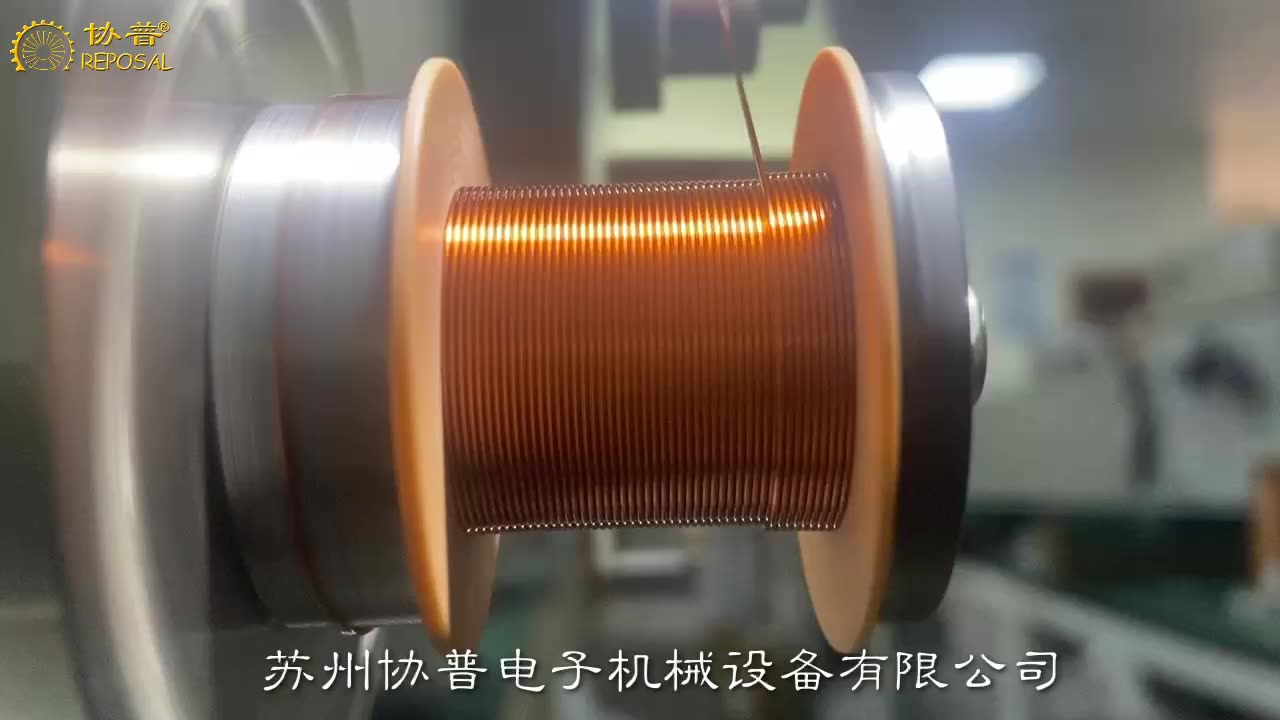
To solve this problem, we propose an acceleration and deceleration method based on 5-segment S-curve. The algorithm uses linear acceleration or deceleration at the end and end of the line motion control to help reduce coil defects. We first verify the feasibility of the algorithm by using ADAMS software. The software simulates the motion of the precision winding coil and obtains the velocity curve and displacement curve during the motion. Later, the experimental results show that the method of adopting S-curve in the alignment speed control can reduce the coil defect by up to 50%. This shows that the 5-section S-curve motion control algorithm is a promising method to improve the precision and efficiency of the winding process of electric precision coils. By using this algorithm, coil manufacturers can reduce the risk of coil defects and improve coil performance.
Winding machine is a special production equipment for precision winding coils. They can be divided into stator winding machine, flying fork winding machine, ring winding machine and flat winding machine according to the working mode and object. Different types of equipment are suitable for the production of different objects. For example, the stator winding machine is mainly used to produce motor stator coils, while the parallel winding machine is used to produce electromagnetic switching coils.
Ordinary algorithm of parallel winding machine in the production of precision winding coil products, although our mechanical structure, parts processing accuracy has been done very well, but often there is a problem of low wiring accuracy. In the process of winding a line coil, there are two main movements, one is the rotating movement of the skeleton, which is called winding movement, and the other is the translation movement of the guide needle, which is called wiring movement, and wiring transport is matched with winding movement. After years of technical accumulation, we analyze that the leading role in the alignment accuracy is the alignment movement of the guide needle. Therefore, if you want to improve the alignment accuracy of the coil, you need to optimize the alignment movement of the guide pin.
In fact, we have always believed that the winding machine is equivalent to the lathe in the electrical industry, its importance is self-evident, so for its accuracy, there have been many experts and scholars to study this.
Some people studied the mathematical model of precise alignment based on axial pressure compensation around the axis in the process of alignment. The axial pressure was used to improve the alignment regularity of the coil, and the mathematical model was established according to the analysis of the end point of the coil alignment, which improved the alignment accuracy of the coil.
Some people use the 5-section S-curve control algorithm and the 7-section S-curve control algorithm respectively in the research. In motion control, the 7-section S-curve is more complicated than the 5-section S-curve control. This method has achieved more results in the field of CNC machining, but it is not mature in the field of winding machine.
The tension instability caused by the friction between the enamelled wire and the conductor nozzle during coil winding has been studied, which leads to the uneven wiring of the coil and the breakage of the enamelled wire.
Some people have studied the low efficiency of the winding machine in the traditional winding control because of the inertia error in the process of the winding machine. Instead, the servo motion wiring and the inertia error supplement are used to improve the control efficiency of the winding machine.
PLC control is commonly used in the winding machine wiring control system, through PLC control servo motor can realize the winding machine wiring control, both PLC control stability and high precision servo motor advantages. However, there is a sudden impact of guide pin speed in the coil alignment of parallel winding machine, so it is necessary to further optimize the change of guide pin running speed to improve product quality and the smoothness of wire alignment speed. The S-curve algorithm is a kind of smooth transition of speed in the process of motion, which is often used in machining to solve the problem of breaking the tool caused by speed impact and improve the precision of machining products. In the winding machine, the speed of the guide needle can be changed into an arc smooth transition by controlling the movement track of the guide needle, improving the alignment accuracy and product quality.
To sum up, an algorithm based on 5-segment S-curve motion control is proposed to solve the problem of velocity shock in the process of coil alignment by analyzing the law of coil alignment. ADAMS software is used to simulate the trajectory of the guide pin to verify the feasibility of the algorithm. And the application of the example proves that the 5-section S-shaped curve can effectively solve the phenomenon of crossing and protruding in the process of winding, and improve the precision of winding.
Coil wiring principle
The winding method is flat winding, that is, the enameled wire moves synchronously with the guide pin and always keeps perpendicular to the skeleton during winding. The frame is driven by the winding motor with the guide needle movement, the enameled wire is wound on the skeleton, in which the guide needle is located in the wiring arrangement mechanism and the winding mechanism are two independent mechanisms. The winding mechanism is divided into three stages according to the motion process of the guide pin, namely acceleration and deceleration stage, uniform speed stage and end point return stage. The acceleration and deceleration stage can be divided into two parts: acceleration stage and deceleration stage. In the early stage of the alignment movement, the guide pin speed from zero to uniform speed belongs to the acceleration stage. At the end of the alignment movement, the process of decelerating until the speed reaches zero is a deceleration stage. The middle constant velocity stage is the constant velocity motion stage of the guiding needle. The terminal reentry stage is a process in which the guide needle accelerates backward again after slowing down and stopping. Here we explain:
Acceleration and deceleration stage
In order to arrange the lines evenly, the two movements of guide pin movement and skeleton rotation should meet certain coordination relations during acceleration and deceleration stage. The time for the guide needle to move one diametral width distance must be equal to the time for the skeleton to rotate once, that is, the guide needle to move just one diametral distance when the skeleton rotates once.
REPOSAL® winding Machine successfully overcomes the polarization grid precision winding technology
Since these polarized wire grids, which are wound by precision winding machines, have no underlying substrate, they have the advantage that they are not affected by substrate related dispersion and absorption, and there is no beam deviation during transmission. This provides a thin, compact and versatile polarization element with a high degree of polarization over a wide transmission range.

At present, because there is no professional winding machine, most of the polarization grid used in our country is imported polarization grid, and the price is expensive; However, the domestic processing method of wire grid mainly uses manual winding, which has low precision and long production cycle. At the same time, the winding machine at home and abroad is mainly used in electronic components, sensors, etc., the control variable is relatively single, and the main control mode is tight layout, even the high precision winding machine, there are few equal spacing layout for the polarization line grid, so the accuracy can not meet its needs. Therefore, it is very important for the coiler to overcome the polarization grid precision winding technology.
REPOSAL® has successfully released a radiofrequency ablation catheter winding machine
Radiofrequency ablation has ablation and cutting functions, and the main therapeutic mechanism is thermal effect. Radio frequency refers to radio frequency, frequency up to 150,000 times per second of high frequency vibration, but it does not belong to the division of bands in radio communication.
The coiling process is completed by continuous test and optimization of the coiling machine.
The working flow of this winding machine is as follows:
1. The active wire feeding device of the radiofrequency ablation catheter winding machine ensures that the wires are constantly connected and not tied.
2. Double fold section A measurement line.
3. Manual folding head.
4. Manually fix the thread head (Two schemes are tentatively proposed for fixing the thread head)
4.1 Fix the starting position with glue. The fixture locks the PEEK tube.
4.2 Kangtong wire is hung on the feature of steel pipe. Glue to fix the ends after wrapping.)
5. Press the start button of the radiofrequency ablation catheter winding machine to wrap.
6.(During the winding process of the radiofrequency ablation catheter winding machine, both AB and AB segments have adjustable tension)
7. Wrap the jump grid to the specified position (the specific hop length can be set, and the rotation Angle can be set.
8. After the radiofrequency ablation catheter winding machine is finished, the feeder stops at the end and maintains tension.
9. Fix the end of the line by manual dispensing
10. Both ends of the radiofrequency ablation catheter winding machine are coaxial, and the rotation direction is synchronized.
11. Adjustable pre-drawing force is required at both ends of the locking shaft core.
Precision Winding Machine | Hollow Coil Winding Machine | Whole Column Coil Winding Machine
Precision winding machine
Precision winding machine For general winding machines, including CNC and automatic winding machines, only the set number of turns of enameled wire is required to be wound, and the appearance is roughly flat, but there are some special high-demand occasions , It is required that the arrangement of enameled wires must be neat without a random winding.
This kind of coil has several advantages. First, the consistency of inductance is very high. Second, the enameled wire occupies less space, and the enameled wire can reach the ideal neat arrangement. Third, the energy density is high. Fourth, the high temperature resistance performance is better. , The enameled wires are in line contact, and in the case of random winding, the superimposition between the wires will have a little contact, and it is easy to break down under high temperature and high pressure.
In order to achieve a stable and neat arrangement, in addition to the requirements for enameled wires, compared with general coil winding machines, high requirements are put forward for the electronic control, mechanism design and manufacturing accuracy of structural parts of the fine winding machine.
REPOSAL® Winder Releases Coded Teach Winder Control System
REPOSAL® Winding Machine Releases Code-Type Teaching Winding Machine Control System
REPOSAL® Winding Machine, a domestic coil intelligent manufacturing solution provider, has launched its new generation of code programming teaching type winding machine control system that is more open, intelligent and highly autonomous for coil winding enterprises - REPOSAL® Winding machine SP500-R5 system. Compared with the traditional dialog-type winding machine control system, the SP500-R5 system has achieved major breakthroughs in operation logic, technical architecture, and function implementation. Features.
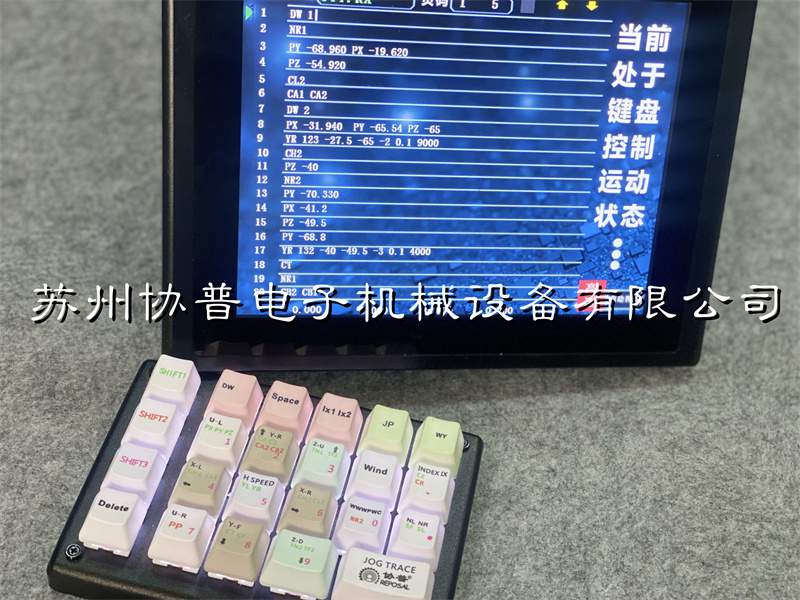
The SP500-R5 system adheres to the concept of "openness and intelligence". Based on the functions of the traditional dialog-based winding machine control system, it integrates the actual needs of the winding factory, and is committed to realizing the coil winding process programming process from the traditional parameter dialog. A major innovation and upgrade from control to code teaching programming.
REPOSAL® winding machine releases special winding machine for frequency divider inductors
REPOSAL® winding machine releases special winding machine for frequency divider inductors
In daily life, have you ever noticed more than one horn on your car? And more expensive cars have more horns. According to normal people's thinking, the car as long as there is a horn can emit sound signals on the line, more horn is why? The reason is very simple, for example, the turn signal and the warning horn are completely different, the sound frequency is different, and the sound range of the speakers used for high and low is naturally different. A single speaker cannot play a full frequency sound, and a sound may require a combination of multiple channels of sound to achieve a clear cue.
Therefore, in order to make each speaker emit audio suitable for it, it is necessary to use a tool such as a frequency divider. In simple words, the frequency divider is a filter circuit composed of a capacitor and a frequency divider inductor coil wound by the frequency divider winding machine. The capacitor filters the low frequency to the tweeter, and the frequency divider inductor is wound by the frequency divider winding machine to filter the high bottom to the low frequency to the woofer, so as to distinguish the sound signals in different frequency bands in a sound. It has different sound frequency channels, high frequency sound channels can only pass high frequency sound, middle and low frequency sound the same. After the sound is distinguished, the sound is amplified and played in the corresponding sound amplifier, and finally we can get the most accurate audio we want.
Frequency dividers are divided into two categories, one is a power divider, and the other is an electronic divider.
The power divider is set in the speaker, the power amplifier in the speaker first amplifies the sound power, and then the power divider divides it into three audio signals, high, middle and low, and finally sends it to different speakers for playback. The advantage of this power divider is that it is simple and convenient to connect and use, but its disadvantages are also obvious, that is, its power consumption is large and the parameter deviation value is large, the error of the sound frequency is large, and its error is related to the impedance of the speaker, so it is not convenient to adjust.
REPOSAL ® winding machine has successfully realized the coil preparation process of the frameless capillary magnetic liquid acceleration sensor
In particular, the non-magnetic material in the magnetic liquid will be subjected to a magnetic field force in the non-uniform magnetic field, which makes many magnetic liquid acceleration sensors can be designed based on this characteristic.
These characteristics make the magnetic liquid acceleration sensor has many advantages compared with the traditional acceleration sensor, such as no wear, high sensitivity and simple structure.
However, most of the existing magnetic liquid acceleration sensors use solid mass blocks as non-magnetic substances, and use coils to detect changes in inductance under different accelerations to obtain output signals. However, its disadvantage is that it leads to complex magnetic circuit and poor sensor stability.
A new solution emerged -- the capillary magnetic liquid acceleration sensor, good stability, simple magnetic circuit, accurate and reliable measurement results and long service life.
REPOSAL's successfully developed precision flexible Roche coil winding machine
Precision Flexible Roche Coil Winding Machine is a special equipment for winding precision flexible Roche coils. With the actual project as the background, Xiepu successfully developed a precision flexible Rogowski coil winding machine by decomposing the flexible Rogowski coil winding process.
The precision flexible Roche coil winding machine does not belong to the ranks of general numerical control equipment, but a special non-standard equipment. For this type of equipment, it is mainly reflected in a special purpose. Since the special purpose means that the market demand is not large, it is indispensable. For equipment manufacturers, the development of such special equipment is not favored, and cost control is very difficult.
In addition, the current domestic manufacturers of flexible Roche coils have limited demand for equipment. At the same time, if you want to control the pitch accuracy and alignment, the equipment research and development costs are relatively high, and the market risk is large. At the same time, for equipment users, their corresponding The supporting equipment and instruments are a large investment.
REPOSAL Winding Machine® Released Tandem flat-wound winding machine
REPOSAL Winding Machine® Released Tandem flat-wound winding machine
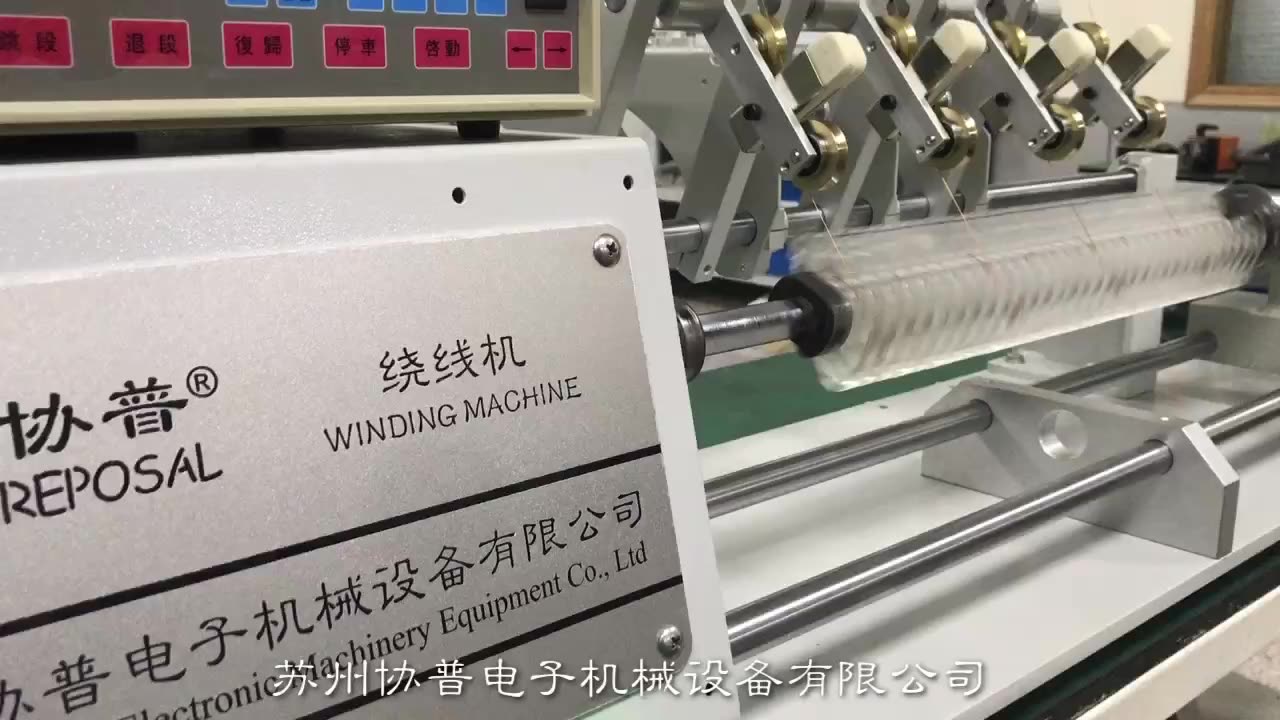
REPOSAL Winding Machine® Released Precision Automatic Paint Stripping and Wire Breaking Winding Machine
Suzhou REPOSAL Electronic Machinery Equipment Co., Ltd. releases
precision automatic paint stripping and wire breaking winding machine
In the inductive coil
winding process, the winding process requirements of the coil are quite
different.The diameter of the enameled wire varies from thin to thick, the
structure of the coil varies from disk to column, and the type of enameled wire
ranges from ordinary to self-adhesive wire. Therefore, for a coil winding
factory that does not emphasize competitiveness, the machine required is a
winding machine with a larger range of adaptation, but often a winding machine
with a larger range of adaptation is for each specific specification of coil
winding. Whether it is quality or efficiency, it is difficult to have targeted
competitiveness.
In order to keep our customers competitive in the induction coil winding process, we have developed this winding machine-precision automatic paint stripping and breaking winding machine in response to customer needs.
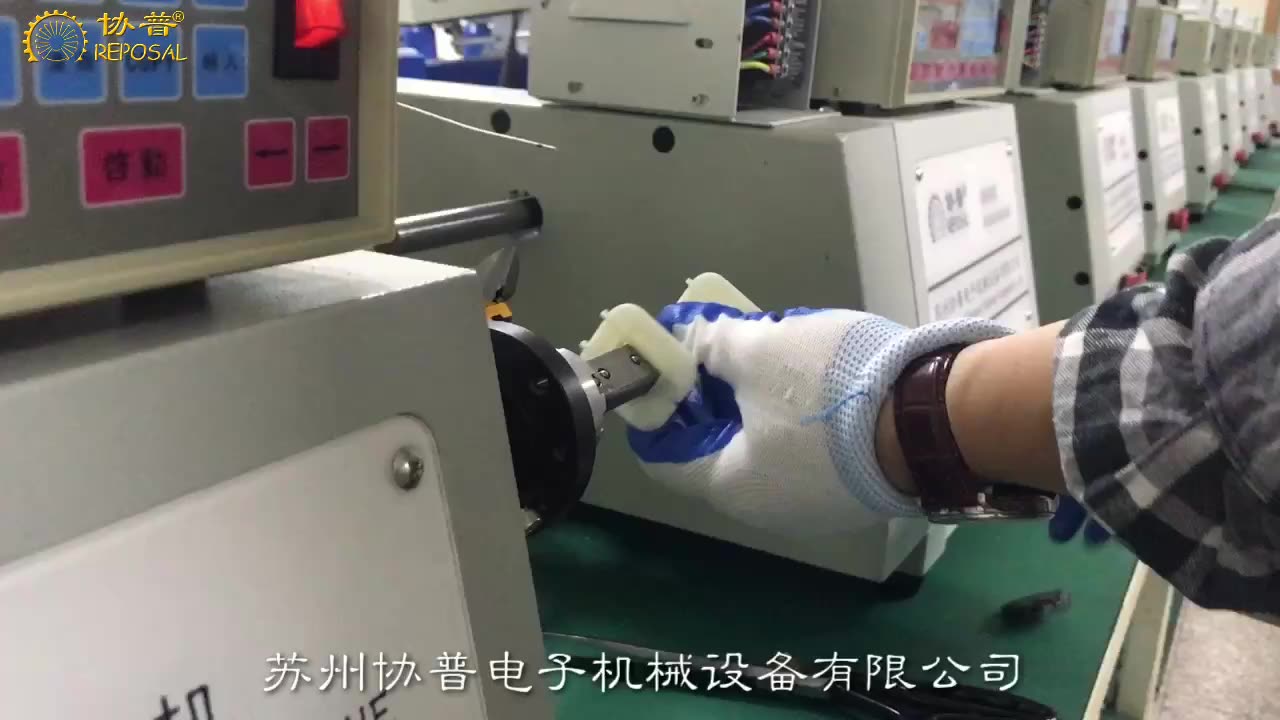
This model is mainly aimed at coils with a skeleton with a larger
enameled wire diameter. It has several features, one is the fast winding speed,
if it can maintain a faster winding shaft speed when the diameter of the
enameled wire is larger, and the other is the winding line is flat. Through
control and targeted structural optimization, a compact and consistent coil can
be stably wound. Third, there is an automatic paint stripping function. For
thicker non-direct welding enameled wires, adding this function is equivalent
to combining two processes Integrating into one process, the fourth is to add
the function of automatic disconnection.For thicker enameled wires, automatic
disconnection improves efficiency, strengthens consistency, and significantly
reduces the labor intensity of operators.
For
details, please refer to the video. The operation beat of this video is taken
during the acceptance of the machine. The entire operation process is fast and
stable, but in fact, there is still room for improvement in the efficiency of
fixing and dismantling the enameled wire head.
Precision hollow coil winding machine
Precision hollow coil winding machine
Winding machine selection
In the narrow sense, the winding machine mainly refers to the winding machine of various enamelled wire coils, these coils may be transformers, relays, inductors, current transformers, various sensors, these coils can be seen everywhere in our lives, the common feature is to use enamelled wire winding, the difference is according to the design requirements, and the cost and efficiency requirements of industrial products, Its winding process is not corresponding, so derived from a variety of different winding machine, we show on the official website is only a part of the conventional winding machine, and some are customized, or special industries are not displayed, if you need to know, you can contact us.
Coils can be seen everywhere in our lives, such as the electric meter in the home, there are metering induction coils, trip coils in the circuit breaker, transformer coils in the community, various motor coils in industrial automation, various sensor coils, starting coils on the car, ignition coils, power motor coils on the bullet train, etc., it is no exaggeration to say that we live in a world of coils. There are so many coils, and the corresponding winding machines are different, so the winding machine is as important to the electrical world as the lathe is to the mechanical world.
There are so many types of winding machines, if you are not familiar with them, those selections have become a big problem, we now make a simple introduction from several aspects.
One is the winding method, which is generally divided into parallel winding machine, ring winding machine, and flying fork winding machine.
Flexible Driveline Coupling special winding machine
Flexible Driveline Coupling special winding machine
The automobile drive shaft is the part connecting the gearbox and the drive axle. It is a high speed rotating body, and the drive shaft connecting disk is the part balancing the action of the drive shaft.
The structure of the connecting disk of the drive shaft is shown in the figure below:
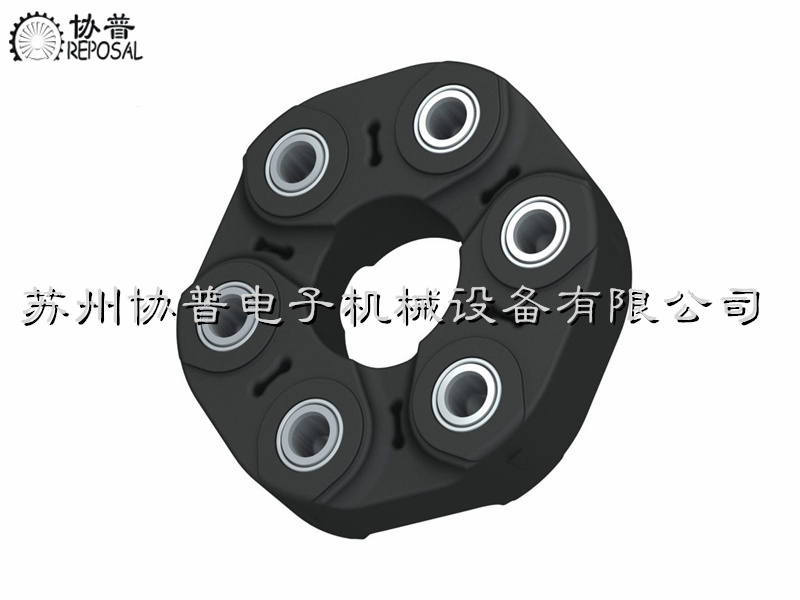
Existing shaft connection plate is made up of rubber vulcanization six sets of steel, its structural strength mainly provided by the rubber, in order to increase the structural strength, the manufacturer will before die casting vulcanized rubber, between the six sets of steel nylon line, its technology and processing technology is very similar to synchronous belt, between the six sets of steel round the multi-layer nylon thread, die-casting vulcanized rubber, It's a good reinforcement. Such as Mercedes-Benz, Ford have adopted this process.
REPOSAL® machine research on tension control of transformer winding machine
In modern society, electricity is like a surging torrent, injecting strong impetus into our life and production. With the rapid development of China's science and technology and economy, the demand for electricity is increasing day by day, and the demand for transmission and distribution transformers, as an important cornerstone of the power system, is also rising.
The transformer is
the "heart" of the power system, and the winding coil inside it is a
key component of this "heart". The winding quality of the enameled
wire and insulating tape in the winding coil directly determines the
reliability of the transformer. The quality of this winding depends to a large
extent on the performance of the transformer winding machine.
With the sharp
rise in demand for transformers, the performance requirements for transformer
winding machines are becoming more and more demanding. A high-performance
transformer winding machine must not only meet the requirements of safety,
intelligence and high efficiency, but also have high-stability hardware,
easy-to-use software and excellent tension control.
However, at
present, the development of China's transformer winding machine industry is
still facing many challenges. The level of intelligence is relatively low, the
stability needs to be improved, and most of the high-end equipment relies on
imports, and the price is high.
REPOSAL® machine
is well aware of these challenges and has been working hard to improve the
performance and quality of its products. It continues to increase R&D
investment, is committed to improving the intelligent level and stability of
the winding machine, and strives to contribute to the development of the
industry.
When the
transformer winding machine is working, its coil is usually metal wire and
insulating paper, because they have a certain elasticity, the change of coil
conveying speed or roll radius will lead to the change of winding tension. For
example, in the winding and unwinding process, if the angular velocity of the
roll is constant, the change in the radius of the coil will cause tension
fluctuations. If the tension is too large, the coil may become thinner or even
break; If the tension is too small, the material will be unevenly arranged or
wrinkled, which will affect the quality of the transformer winding coil.
Compared with
foreign countries, China's existing domestic transformer winding machine has
deficiencies in tension control. Its tension is usually generated by mechanical
friction, which is not stable enough, which can easily lead to problems such as
sparse arrangement of wires and insulating tapes, and out-of-tolerance of the
outer diameter of the coil. In addition, compared with developed countries in
Europe and the United States, there is a gap in the overall development level
of China's transformer winding machine in terms of processing quality and
production efficiency.
The specific
performance is as follows: First, the processes such as wiring and wiring,
adding insulation layers rely on manual operation, which is inefficient and unstable
in quality. Second, the motor frequently starts, stops and reverses during the
winding process, the tension fluctuates greatly, the coil winding is irregular,
and the quality is difficult to guarantee. Third, the mechanical structure of
the domestic winding machine is relatively simple, and it is not competent for
the winding task of complex coils.
The development of
foreign transformer winding machines is relatively mature. The T-600AH
automatic transformer winding machine from Trishul.Engineers in India can wind
wires and insulating tapes synchronously, with high precision, stable tension
and high efficiency. The EFECO 800 automatic winding machine from
Tuboly.Astronic AG in Switzerland is even more excellent, with high-speed,
high-precision winding and an intelligent cable routing system. The products of
companies such as MTM in Canada, LAE in Italy and UPI in Korea also have high
intelligence and stability.
In terms of tension control research, many scholars have been exploring it in depth since the 90s of the last century. Bastogne T, Koc H and other scholars have pioneered theoretical research and modeling simulation. Entering the 21st century, more scholars are getting involved.
REPOSAL® machine
actively pays attention to the relevant research results at home and abroad,
and applies beneficial theories and technologies to the improvement of its own
products.
The winding
electronically controlled tracking system proposed by Mahawan B et al. in 2001
can still realize the trajectory tracking control of equipment under large
interference. In 2008, Wen P et al. designed a tension control scheme that
allowed the winding speed to be changed under a certain tension fluctuation
while maintaining quality. In 2010, Ponsart J C et al. applied the observer
theory to a transformer winding machine to improve the accuracy of tension
control. In 2017, Mahesh Ghate et al. optimized the tension system for a
specific winding machine and showed good robustness. In 2020, Ma Quanjin et al.
designed a dual-PID tension control system to address the tension fluctuation
problem in a 3-axis fiber winding machine applied with filament winding
technology.
Since the 70s of
the last century, China has begun to develop transformer winding machines, and
has achieved certain results through imitation and the efforts of scholars.
However, due to the monopoly of foreign core technologies, there is still a gap
with foreign countries, especially in terms of manufacturing processes and
control schemes.
At present, the domestic transformer winding machine is mainly in the semi-automatic stage. For example, F. of Dongguan Zongheng Electromechanical Technology Co., Ltd. TWloo CXL transformer winding machine for small and medium-sized transformer coil winding. The ZBR.800/1000/1200 multi-head automatic wiring winding machine of Jiangxi Yibo Automation Equipment Co., Ltd. can realize automatic wire arrangement.
REPOSAL® machine has been committed to promoting the
development of domestic transformer winding machine in the direction of full
automation and intelligence, and constantly optimizing its own manufacturing
process and control scheme.
However, there is still a breakthrough in the layout of
insulating tape and tension control in China, which greatly affects the quality
and production efficiency of the winding coil. Therefore, it is of great
significance to develop a control system that can automatically arrange wires
and insulating tapes with constant tension.
Tension control is a key technology for transformer
winding machine equipment. If the tension is too small, the wire or insulating
tape will slacken, accumulate and wrinkle; Excessive tension can cause it to
deform, stretch excessively, or even break. For transformer winding machines,
the tension control condition directly affects the compactness between the
layers of the winding wires.
At present, there are three main schemes of tension
control: manual, semi-automatic and fully automatic. The manual control needs
to be adjusted manually in stages, the semi-automatic control adjusts the
tension by detecting the change of the roll diameter, and the fully automatic
control is adjusted by directly measuring and feeding back the tension data by
the tension detector.
In the 80s of the last century, manual tension control
was mostly used in China, which was gradually replaced due to the increase in
demand. Since the beginning of this century, domestic scholars have conducted
in-depth research on the automatic tension control system for rewinding and
unwinding.
In 2005, Yang Tao and others from Tianjin Polytechnic
University used a PLC design scheme to accurately control the winding speed of
fine enameled wire. In 2010, Shi Yaoyao et al. studied the discontinuous coil
process and realized winding through the PID algorithm. In 2018, Zhiyong w et
al. established a constant tension control system for the problem of triaxial
fiber winding machine. In 2020, Song Chenliang et al. optimized the tension
adjustment effect of the winding machine through the pendulum tension
adjustment mechanism and the deformed PID control algorithm.
REPOSAL® machine has never stopped exploring tension
control solutions, and constantly tries to innovate to enhance the
competitiveness of products.
However, due to the complex structure of transformer
winding equipment and many influencing factors, the tension control system has
nonlinearity and coupling in different situations, which is still a difficult
point in equipment control. Constant tension control is very important to
ensure the quality of winding, so it is of practical significance to study the
constant tension control system suitable for industrial production.
In the winding coil structure of distribution
transformer, insulating paper tapes need to be arranged between the wire
layers, so the transformer winding coils are usually wound in layers. The
winding process is more complicated, the pilot wire is unwound and sent to the
spindle mold base, during which the oscillating roller adjusts the tension and
speed, and the spindle motor drives the spindle winding. Then the insulating
tape is unwound and sent to the spindle mold base, and multiple coil rolls
cooperate to adjust the tension. Finally, a plurality of motors work together
to drive the spools and other spools for the first layer of winding and arrangement,
after the completion of the wire motor reversal, the pressure roller shears the
insulating paper, the glue sprayer glues, and then the next layer of winding.
Taking Switzerland EFECO 800 transformer winding machine
as an example, its mechanical structure mainly includes spindle mold base,
winding spindle, glue spraying machine, etc. The winding spindle includes a
spindle motor, a reducer, etc., which drives the spindle to rotate and the foot
switch controls the start and stop. The wire winding mechanism has pay-off
wheels, adjusting handwheels, etc., and the insulating tape winding mechanism
has tension feedback devices. The wiring mechanism is composed of a wire spool,
a wire trolley, etc., which can achieve accurate wire arrangement.
For transformer winding machines, the tension control
directly affects the compactness between the winding lines. In practice, the
machining accuracy and the performance of the sensing device will have an
impact on the tension control. For example, the change of reel diameter, the
start-stop and acceleration and deceleration of the reel, the accuracy of
equipment manufacturing and assembly, the forward and reverse rotation of the
motor, and the hardware performance.
There are three ways to test tension. Directly using the
tension sensor to measure, the operation is simple but the limitation is large;
Floating roller tension detection, the measuring device is flexible but the
accuracy is low; Floating roller/feedback composite tension detection, high
accuracy but complex method.
In the process of arranging the transformer winding
machine, the adjustment of the wiring mechanism and the winding position and
the control of the wiring angle are the key to ensure the compactness of the
winding wire.
The cable arrangement mechanism measures the angle
through the rotary encoder on the spindle and transmits the data to the
controller, and the controller drives the wire motor after processing to
realize the speed coupling of winding and wire arrangement.
In the actual winding, the tension of the wire and the
insulating tape should be kept constant and cooperate with the wire
arrangement. In the automatic wiring control scheme, the main controller
controls the motor unit to work together, the spindle and the wiring mechanism
cooperate with the layered winding, the encoder feeds back the data in real
time, and adjusts the speed of each axis according to the control algorithm to
ensure the accuracy of the wiring.
The angle of the cable is very important, too large or
too small will affect the effect of the line. When winding, the line is
adjusted according to the change in angle, the feed rate is brought in, and the
overall trajectory is followed. Since winding is carried out in layers, divided
into wire layers (odd layers) and insulating layers (even layers), the wire
laying process can be divided into multiple stages and cycles.
The automatic wiring of the transformer winding machine
has high requirements for the motor control algorithm, which requires the
coordinated operation of the motors of each shaft and the close cooperation of
the drive actuator to jointly complete the automatic winding and arrangement of
the transformer coil. The common multi-motor cooperative control structures
include parallel synchronous control, master-slave motor control,
cross-coupling collaborative control, adjacent cross-coupling control and
deviation coupling step control, each with its own advantages and
disadvantages.
In conclusion, transformer winding machines are very
important in the power field. Although China has made certain achievements in
this field, it still needs to make continuous efforts to strengthen independent
research and development, improve the technical level, narrow the gap with
foreign countries, promote the development of the industry, and contribute more
to the power industry. REPOSAL® machine will continue to uphold the spirit of
innovation and enterprising, and make unremitting efforts to improve the
overall level of China's transformer winding machine.

